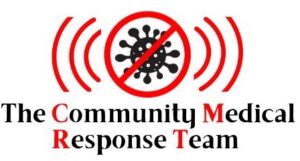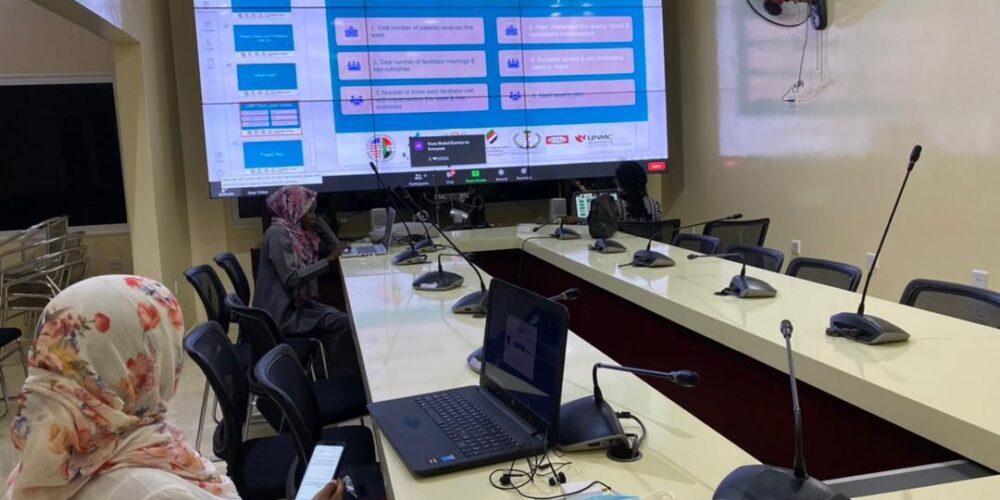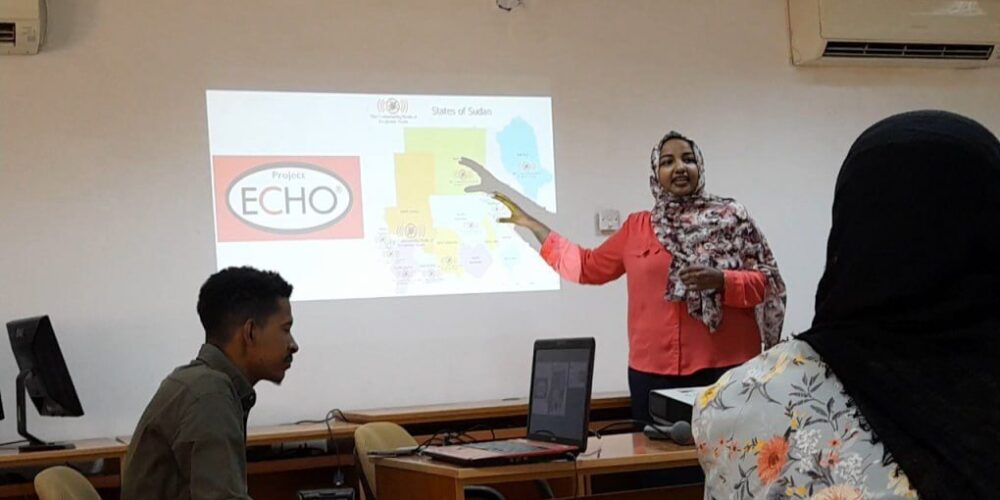
The Community Medical Response Team (CMRT):
community campaigns addressing a range of health issues including COVID-19, cancer, Dengue fever, and other communicable and non-communicable diseases. Additionally, they have organized more than 70 vaccination and primary health clinics across Sudan, delivering over 25,000 doses of COVID-19 vaccinations to remote and underserved areas. To ensure high-quality care and continuous professional development, the team receives regular evidence-based training from subject matter experts. Utilizing the Project ECHO® telementorship platform, immediately after the war the team engages in biweekly Emergency Response ECHO training sessions through a Telegram® group with over 14,000 health professional learners. These sessions cover various topics including basic emergency care, trauma care, triage, psychological first aid and trauma mental health, outbreak response, management of victims of sexual violence, and noncommunicable disease management. This program has led to the creation of the Healthcare Shortage Crisis Intervention - Sudan Emergency Response.
Amidst escalating conflict between the Sudan Armed Forces (SAF) and the paramilitary group Rapid Support Forces (RSF) on April 15, 2023, a dire humanitarian crisis has unfolded. According to recent data from the Preliminary Committee of the Sudan Doctors Trade Union, an alarming 67% of hospitals in conflict-affected areas are now rendered non operational, accounting for 88 main hospitals across the capital and states.
This staggering figure underscores the severity of the situation, with the crisis exacerbating daily and adversely affecting patients suffering from acute trauma, chronic illnesses, and those vulnerable to seasonal outbreaks.
The displacement of thousands of civilians to neighboring states has further exacerbated the strain on healthcare resources, particularly in resource-limited regions. As a result, there is an urgent need to escalate healthcare services in these areas to meet the escalating demand.
These healthcare disruptions are inflicting long-term health repercussions on already vulnerable populations, including pregnant women and individuals with chronic illnesses. Shortages of essential medical supplies such as transfusion equipment, blood, intravenous fluids, and staff have been reported by the World Health Organization (WHO) in its 2023-24
assessment. Given the limited access to hospitals, it is imperative to adopt
an alternative approach to address the current crisis. .
Program Description:
General Objective: to deliver emergency health services to address the immediate needs of victims affected by conflicts, displacement, and other crises such as disease outbreaks and natural disasters.
Beneficiaries: The primary beneficiaries are individuals in conflict zones, newly displaced persons, returnees, and vulnerable host communities residing in areas affected by emergencies. These emergencies may include conflicts, disease outbreaks, and natural disasters where access to basic
healthcare is limited.
Targeted Geographic Areas: The geographic coverage of this program encompassing various states and regions. Specifically, the targeted areas include:
-
- .Red Sea State: Port Sudan
- .Northern State: Dongola
- North Darfur: El Fashir
- South Darfur: Nyala
- Khartoum: Omdurman and Khartoum
- Kassala: Kassala
- River Nile: Atbra
These regions have been identified as areas with significant populations in need of emergency health services due to the presence of conflicts, displacement, and other emergencies. Levels of Coordination: SUDRO collaborates closely with The Ministry of Health at both the federal and state levels, as well as international organizations such as the World Health
Organization (WHO), and community-based organizations (CBOs). This collaborative effort ensures comprehensive and coordinated healthcare delivery and response initiatives, effectively addressing the needs of the population across various regions and communities.
Main Activities:
A. Competency based training using ECHO model of learning:
Competency-based training utilizing the ECHO model of learning was implemented through the Sudan Emergency ECHO program, a pioneering initiative tailored to address rapidly changing on-the-ground conditions. Developed in partnership with the WHO Sudan and EMRO, this program provided training to 1500 medical frontline workers on Emergency Response in crisis settings. The ECHO programs has been an approach to
continuous learning and a tool of strengthening the ground activities.
B. Comprehensive Basic Medical Care:
The clinic activities, launched on May 15, 2023, initially covered locations in Khartoum, Madani in Gazeira State, Nyala in South Darfur, Elfsahir in North Darfur, and Algenina in West Dongola. Over time. SuDRO collaborated with CORE to include additional areas such as Dongola and Marawi in the Northern state and Port Sudan in the Red Sea. The clinics operate either as mobile or fixed facilities, depending on the flexibility of the location.
By January 2024, the initiative further expanded its reach to encompass Kassala and the River Nile states, with the cumulative number of patients seen exceeding 20,200. Presently, new teams are being established in Gadrif, Sinnar, and the White Nile states.
Health activities conducted by the Sudan Emergency Response
program may vary based on local context and the emergent
needs. In general, these activities entail:
- Provision of treatment and managing common illnesses and chronic diseases, addressing trauma cases, and facilitating referrals when necessary.
- Managing seasonal diseases and responding to outbreaks by conducting community health education initiatives. Notably, in response to the recent cholera outbreak in Port Sudan, SuDRO collaborated with the World Health Organization (WHO) to establish Oral Rehydration Corners in 15 locations which has enabled effective intervention measures.
- Additionally, specialized training and services related to sexual and reproductive health, including the response to gender-based violence (GBV) cases, are provided in collaboration with the Strategic Initiative for Women in the Horn of Africa (SIHA).
- Furthermore, discussions are underway to incorporate a new line of response to mental health and psychological traumas within the clinics. Collaborating with Ahfad Trauma Centers will complete SuDRO’s vision that aims to provide holistic services and comprehensive care to address the health needs of the affected population.
The success of this emergency response program has been propelled by the resilience of the volunteers, the collaboration of experts, and the partnerships with organizations and donors. The continuity of funding and continuous evaluation are crucial factors for ensuring the sustainability of such an effort.


